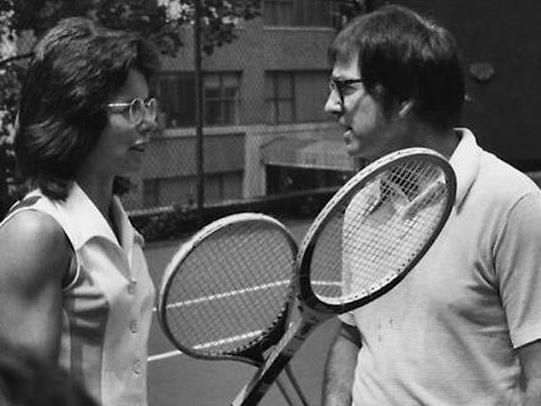As a term, the battle of the sexes is now so commonly used that it has been adopted by radio contests and board games; however only decades ago, it inspired thinking along socio-political rather than comical lines. Before the appropriation – for the purposes of entertainment and amusement – of the language afforded the disparity between men and women, the phrase symbolised the struggle for equality and underscored the fledgling feminist movement. And in 1973, it was used as the title for a series of tennis matches.
The marriage of the phrase and the sport was far from as incongruous as modern comedic usage might suggest; instead, it embodied the bid for empowerment that characterised the era. Tennis offered a microcosm of societal attitudes at large, as well as a substantial opportunity to agitate for change. Billie Jean King, five-time Wimbledon winner at the time (out of 6 career triumphs, and 39 Grand Slam titles), was its champion on and off the court.
King was born into a period of specific gender roles, growing up with the realisation that girls and boys were treated differently, and that the same attention, opportunities and authority enjoyed by the latter was absent for the former. Her observations sparked a desire to find a new way forward; her talent provided the platform. As she described, ‘I didn’t want to be a second class citizen, and I didn’t want anyone else to be a second class citizen too.’ With her fellow female players, she stood up for women in sport, establishing professional tennis and sporting bodies, and vocally challenging he status quo wherever she could.
In the engaging documentary that takes its name from the public spectacle that formed the centrepiece of King’s quest – complete with its underlying egalitarian connotations – Battle of the Sexes explores the well-marketed matches and their impact, then and now. Competing against shameless provocateur, ageing player and otherwise fading star Bobby Riggs, King sought not to secure $100,000 in prize money at a time when equal winnings was almost unthinkable, nor to play in the most watched tennis contest ever still to this day, but to carve out a place of acceptance for the rights of the so-called weaker gender.
Directors James Erskine (From the Ashes) and Zara Hayes (TV’s Wonderland) combine archival footage with frank and informative modern-day interviews to tell a tale centred on a sporting spectacle but steeped in its cultural context, and in the impact of one of its greatest athletic proponents. The combination is seamless, smart, and always effective – not to mention skilled at evoking genuine tension in the on-court action, even with the outcome already in the record books. Those who where there talk through their experiences, and those who were inspired – Venus and Serena Williams and Maria Sharapova, for example – relate their learnings. Sadly, the only contemporary perspective lacking is Riggs, who passed away in 1995.
There’s little subtlety in the presentation by the filmmakers, nor in the repetition of the message and even of the content, but bluntness of tone and duplication of details doesn’t weaken the film’s impact. This is a story with compulsive, captivating force, essaying a society-changing movement, woman and moment in history, all adroitly assembled with candour and cinematic acumen. This is a fitting testament to and chronicle of what the battle of the sexes once meant.
Rating: 3.5 stars out of 5
Battle of the Sexes
Director: James Erskine and Zara Hayes
UK, 2013, 83 mins
Release date: January 10 at ACMI
Distributor: Madman
Rated: PG
Actors:
Director:
Format:
Country:
Release:





